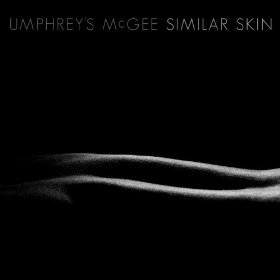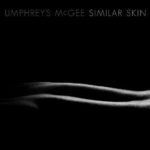
Umphrey’s McGee is one of the most misunderstood bands in rock today. There’s, of course, the name of the band itself, which evokes the fancies of some hippie commune—and which the band has addressed in good humor ad nauseam. There’s the association with all things jamband and then there’s the playing itself, which, while virtuoso, is often critiqued for never settling into a pattern—that stylistically, there are just too many variables to gauge any depth.
But the reality is that regardless of one’s personal opinion on Umphrey’s—such misperceptions are either ignorant or just plain lazy. And with their most recent offering, Similar Skin, Umphrey’s McGee make their most definitive studio statement yet. Skin is a relentless sonic assault showcasing a veteran band wholly confident in its identity as a tightly-knit powerhouse, and determined to impress the mark of that mentality on its listener.
2009’s Mantis demonstrated growth in the studio, and featured some tremendous songwriting, but felt in part too conceptualized and perhaps just out of reach for the band at that particular time. 2011’s Death By Stereo certainly had its fine moments, but was carried on the back of a four-song run and never felt complete front to back. Similar Skin is their arrival. It is aggressive yet slick, dominant yet composed, and cohesive as all get out. The players in Umphrey’s McGee are each masters of their respective crafts, but this collection is greater than the sum of its parts, and speaks to a genuine lack of ego.
The album kicks in with “Linear” which runs along on the spine of a slinky, New Wave bassline from Ryan Stasik that is promptly destroyed by guitars that announce their arrival with the subtlety of a crashing tidal wave
“Cut the Cable” and “Hourglass” follow, two road-tested tunes that really find life in the studio. Both are chunky yet succinct; uptempo rockers that twist in measured angst in between fantastic hooks. Both are brilliant in their simplicity—these are easy songs for neophytes to grab hold of—yet incredibly intricate and sustained by economized nuance.
The bouyant “No Diablo” is probably the most removed from the rest of the record, but provides a pause in a sea of blitz and blister. “Diablo,” a song Brendan Bayliss wrote last year for fellow guitarist Jake Cinninger’s then newborn son, is mushy-laden in a way only Bayliss can express: “Now if you haven’t got too far by now don’t worry…if you’re stick In the crowd and you’ve been thinking out loud, I’d stop…No, I’m not suggesting here that you should hurry…but if everyone’s out for theirs, could there be enough?”
Bayliss’ gifts as a lyricist are as exceptional as it is underrated. On the title track he opines, ‘We all begin with a similar skin…that will evaporate.” Its calculated optimism meets dim existentialism, and demands an honest self-inventory. Most importantly, Bayliss’ lyrics are functional and fundamental to the bigger picture—especially in a band with so many moving parts.
The back half of the record is simply a monster. “Puppet String” may be one of the most complete songs the band has ever written, building in tension and soaring on the strength of an exhilarating chorus. The Cinninger-penned “Little Gift” and “Hindsight” are the heaviest: the former a driving, arena glitz screamer and the latter the vicious, punishing lovechild of Jerry Cantrell and Josh Homme, and certainly the furthest from anything the band has ever recorded.
Then there’s “Educated Guess,” Skin’s most complex piece and, really, a case study of the band itself: stylistically versatile, constantly shifting, and impossible to pinpoint. It settles into a comfortable groove before launching into a back end of heavy riffage, countermelodies, and flat out auditory and neurological chaos. “There’s no need to think this through,” Bayliss sings, and one almost gets the sense that’s the essence of the whole damn thing.
Sure, Umphrey’s Mcgee is elusive. Sure, they’re misunderstood. But with Similar Skin they have served up a record that is not only accessible and cohesive, but just plain good—their best, in fact. And hopefully they’re finally offered some credit for establishing a sound that’s uniquely their own, credit thus far along that has largely been denied by the mainstream media. And really, the cross is no longer the band’s to bear. “Educated Guess” again offers the best advice to listeners: “Make your own translations, bury your face into your own imaginations.” Put in some time, and you might just be astonished at what you discover.



No Comments comments associated with this post